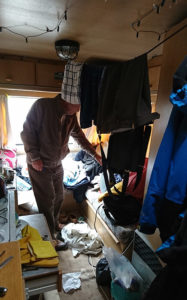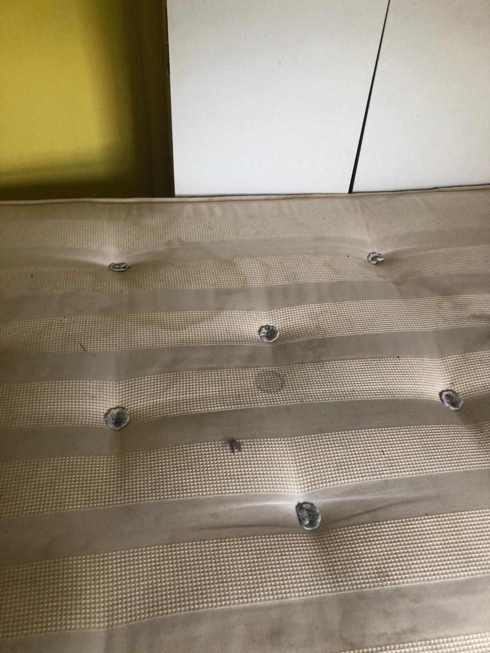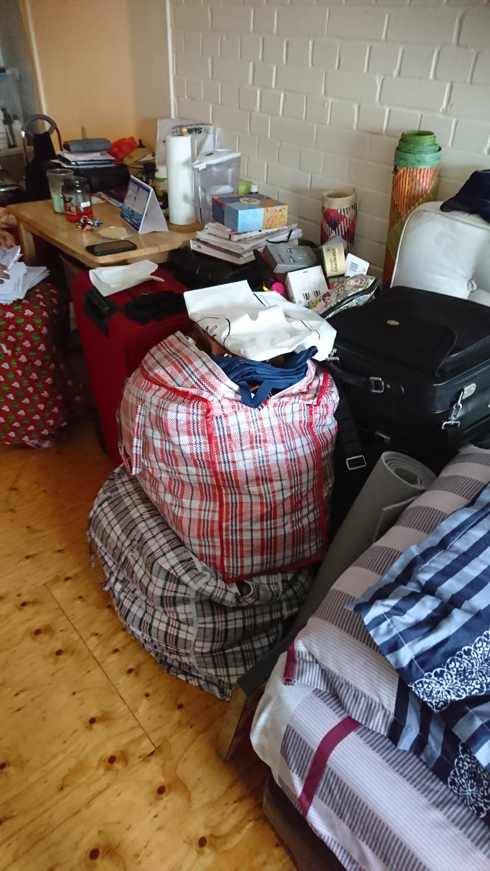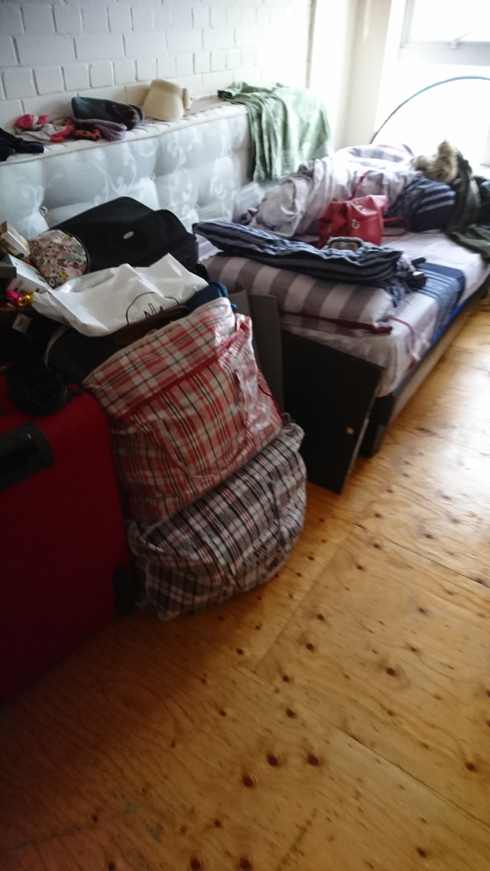The post below – Eddie’s story – is an excerpt from a collection of interviews I’ve made since 2014 with people directly affected by benefit cuts and welfare reform.
This collection is being made possible thanks to a Barry Amiel & Norman Melburn Trust grant.

What happens to my adult child who has learning difficulties when I’m not around to advocate?


Mould in doorway entrance
In my interviews with parents of people with learning difficulties in the past ten years, there was a question which weighed on parents’ minds:
“What will happen to my child when I’m not around to insist that they have housing, income and care?”
This question wasn’t exclusive to austerity, but it took on a new intensity as Cameron-Osborne plans to eradicate public services became obvious.
Parents knew that housing, benefits and care services were being devastated by council funding cuts and welfare reform.
They knew that negotiating austerity’s brutal and labyrinthine public sector bureaucracies for housing, income and care could be devastatingly hard.
“What will happen when my child is an adult alone in austerity?”
That question didn’t really bear thinking about.
—————–
Except that people did think about that question.
I thought about it myself.
I thought about it a lot from about 2014 to 2017, when I came to know Eddie*, a Kilburn man with learning difficulties.
In many ways, Eddie’s life over that time was an answer to that question.
——
Eddie’s story (Eddie’s name has been changed)
Eddie was 51 when we met in 2014.
Eddie had learning and literacy difficulties. He’d received special needs education as a child. Eddie identified as Black British. I knew this, because we filled in a lot of job applications for Eddie together over the years and he always took care with the monitoring parts of the forms.
“I’m British born and bred,” Eddie often said proudly. He said that his parents had come to the UK from Jamaica – part of the Windrush generation.
Eddie had type one diabetes. He injected insulin several times a day. He had trouble managing his diabetes as he aged. He often caught colds and flu. He sometimes struggled to walk, because he had pain in his legs and feet.
Eddie had worked as a kitchen assistant for much of his adult life. He’d been made redundant about six years previously and had not found work again. Eddie signed on for JSA at Kilburn jobcentre. (I met Eddie at the jobcentre during a Kilburn Unemployed Workers’ Group leafleting session there. KUWG volunteers knew Eddie and gave him a great deal of support over the years. They pushed councils and the DWP to keep Eddie on the radar).
Eddie’s mother had died about a decade earlier: around 2004. Eddie had lived with his mother.
Things began to implode for Eddie several years after his mother’s death. He had to negotiate cash-strapped and dysfunctional public sector bureaucracies on his own. Post 2010, as austerity began to bite, the facts of that began to show.
An austerity state could never replace Eddie’s mother.
There was no question about it. I understood from conversations with Eddie that his mother had been the driving force in his life. She’d made sure that Eddie found work and stayed in work. She’d filled in forms and talked with employers about Eddie’s learning and literacy difficulties. At home, Eddie’s mother had kept their flat organised and clean.
Eddie’s mother was one of the few people who Eddie spoke about with affection.
He often said that he missed his mother.
I began to understand what that meant when I saw how Eddie lived.
——
How people with learning difficulties are expected to live
I took these photos inside Eddie’s Kilburn flat in 2014.
This was how relying on the state in austerity looked for people in Eddie’s situation:



The flat was disgusting – full of mould, dirt and vermin. It was all Eddie could afford.
Eddie relied on housing benefit to pay his entire rent. By this time, housing benefit only covered full private sector rents on London’s shabbiest flats.
Eddie’s private-sector landlord charged Brent council £1000 a month in housing benefit for the Kilburn flat in these pictures.
That was a benefits abuse in itself. Eddie’s landlord was paying a Zone 2 London mortgage with the housing benefit he collected by letting such places to councils.
The Kilburn flat had only one room. Eddie’s bed, kitchen, small fridge, washing machine, clothes and belongings were all crammed into that single tiny space. Wet clothes and towels hung from rails and chairs. The floors and benchtops were littered with rubbish, unwashed dishes and rotting food. Mice scuttled under the oven and bed.
Eddie never cleaned the bathroom – ever. There was no window in the bathroom. The whole flat stank of sewerage.
There was one ground-floor door in the flat which lead to a small and filthy backyard. I saw rubbish, used sanitary towels and dead rodents in that backyard. Eddie always kept the door to the yard closed for security. There was a tiny window above the door pane which he never opened. Condensation ran down the inside of the door in rivulets. Thick black mould blossomed inside the flat. It blanketed the walls and the ceiling in the wet air.
“It’s disgusting,” Eddie would say furiously of his accommodation. “I should be in a council flat with a separate kitchen, a separate bedroom. I’m getting sick. Look at this mould on my clothes.”
The noise from neighbouring flats in the house worried Eddie a great deal, too.
Eddie complained that he could hear his neighbours fighting. He called the police several times, because he said that his neighbours had threatened him.
His neighbours, meanwhile, complained that they could hear Eddie and his partner Linda having sex.
The problem was that low-rent flats such as Eddie’s were set in houses of multiple occupation – single houses which owners broke up into tiny rooms to rent out as flats to councils.
These landlords always planned to sell the buildings when the mortgages were finally paid.
Such landlords invested as little in the flats as possible. There was no soundproofing between the rooms. TVs and stereos screamed from each flat. People came and went all day – talking, shouting and slamming doors. The noise went on and on.
Eddie said that noise in the house was made entirely by his neighbours:
“They’re drug dealers. Shouting and yelling. Throwing furniture down the stairs last night. They never go to work. It’s disgusting. I shouldn’t be here.”
Eddie was furious about that.
Eddie was furious about everything.
Eddie’s anger worsened over the years as his living conditions, health and employment prospects deteriorated. He railed and ranted. He was hard to take a lot of the time.
He loathed council housing staff:
“They don’t do anything. They never help,”
He hated the jobcentre staff who he had to report to:
“They’re useless. They should all be sacked.”
He disliked his neighbours:
“They’re drug dealers. Shouting and yelling…they never go to work.”
and he hated immigrants:
“They should be put back where they came from…the problem is like a stray cat. Pick it off the street and then suddenly, you’re a soft touch…British and English people can’t get jobs, or flats, which they should have had, long time…When we had that other bitch in – she was so hard, she wouldn’t allow it. Margaret Thatcher. She was hard, that one. This one [David Cameron] has got no backbone.”
Eddie talked in a monologue which never changed, or ended.
His topics were always the same: he should have a job and a decent home, immigrants should be sent back where they came from, jobcentre and council staff were useless and everyone should be sacked.
—-
In 2015, Eddie was evicted from his Kilburn flat.
Kilburn Unemployed Workers’ Group activists helped Eddie find a similar-sized place – this time in Haringey. One KUWG activist in particular put a great deal of time into trying to solve Eddie’s housing and jobcentre problems. She set up meetings with council officers and pushed councils to provide Eddie with housing and support. She even went as far as to pay the deposit on the Haringey flat out of her own money.
Eddie was evicted from the Haringey flat in 2016.
The Haringey flat – like the Kilburn one – was in ruins at the end of Eddie’s tenancy.
That was because Eddie had exactly the same problems in Haringey as he’d had in Kilburn.
The Haringey flat was tiny – again, it was all that Eddie could afford in London as a housing benefit recipient.
There was only one room in the Haringey flat. The bed, kitchen, living space and all of Eddie’s belongings were crammed into that small, stifling space – a space that he could not air properly, or keep clean:


———————————————–
Continue reading →























